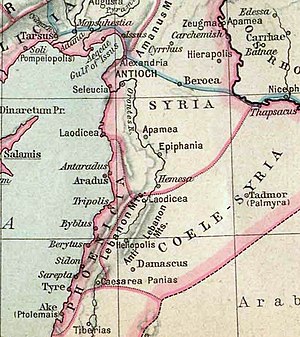
Back Batalla d'Antioquia (218) Catalan Batalla de Antioquía (218) Spanish Battaglia di Antiochia (218) Italian ანტიოქიის ბრძოლა Georgian Slag bij Antiochië (218) Dutch Bitwa pod Antiochią (218) Polish Batalha de Antioquia (218) Portuguese Bitka kod Antiohije (218) Serbo-Croatian Битка код Антиохије (218) Serbian
| Battle of Antioch | |||||||
|---|---|---|---|---|---|---|---|
 A 20th century map of Roman Syria with the ancient sites of Antioch, Emesa (Hemesa), and Zeugma shown, among others | |||||||
| |||||||
| Belligerents | |||||||
| Macrinus | Elagabalus | ||||||
| Commanders and leaders | |||||||
| Macrinus | Gannys | ||||||
| Strength | |||||||
|
Elements of the Praetorian Guard |
Legio III Gallica Legio II Parthica Other rebels | ||||||
The Battle of Antioch (8 June 218) was fought between the Roman army of the Emperor Macrinus and his rival Elagabalus, whose troops were commanded by General Gannys, probably a short distance from Antioch. Gannys' victory over Macrinus led to the downfall of the emperor and his replacement by Elagabalus.
Macrinus' predecessor, Caracalla, was murdered by a disaffected soldier during a campaign against Parthia on 8 April 217. Macrinus himself may have had a hand in the murder of Caracalla. Within days of Caracalla's death, Macrinus was proclaimed emperor with the support of the army. At the time of his accession he inherited all of the problems that Caracalla had left for Rome—war against Parthia, threats from Armenia and Dacia, and extensive fiscal expenditures. Macrinus successfully concluded a peace with Parthia, but it came at considerable cost to Rome. Finally, his policies to reduce monetary expenditures only stoked discontent within the military.
Caracalla's aunt, Julia Maesa, his mother's sister, took advantage of the discontent of the soldiers and spent from her wealth to champion her grandson Elagabalus as the rightful heir to the empire. Elagabalus, chief priest of the god Elagabal, was proclaimed emperor by the soldiers of Legio III Gallica (Gallic Third Legion) at their camp in Raphanea on 16 May 218. In response, Macrinus sent one of his generals, Ulpius Julianus, with a small cavalry force to quell the rebellious soldiers. The cavalry defected and killed Ulpius Julianus, sending his head back to Macrinus in Antioch. The decisive battle took place less than a month later.
While Gannys had the numerical advantage, in the opening stages of the battle Macrinus' Praetorian Guards broke through Gannys' lines, and the latter's troops began to flee. In response, Elagabalus' mother and grandmother joined the battle and rallied the troops while Gannys led his own charge. Gannys' troops turned and renewed the assault, causing Macrinus to flee the battle in fear and return to Antioch. He sent his son and co-emperor, Diadumenian, to Parthia and tried to return to Rome. Both he and his son were caught en route and executed. Elagabalus entered Antioch as the new emperor of Rome, and with Macrinus dead, the Senate had no choice but to acknowledge the ascension of Elagabalus. By March 222, Elagabalus was himself killed by the disgruntled Praetorian Guard, declared an enemy of Rome and subjected to a damnatio memoriae.